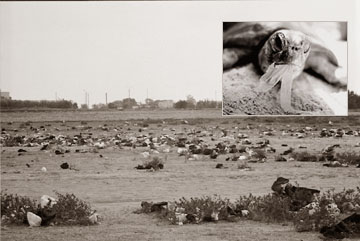|
observer |
|
|
|
|
|
OTHER LINKS |

|

|

|
|
Bag Habits: Kill a tree or choke a fish?You may not be a bad person. You may not smoke, throw your bus ticket on the pavement or keep caged parrots on your verandha. But you may have a dirty environment secret inside the top drawer of your kitchen cupboard. A pile of 'Siri Siri" bags! Relax, you are not alone. Almost every household is bound to have some, tucked away in the hope that one day, you will resuse them - and the surprise is, yes, you will - reuse them.
This is important before they attack us in great numbers, causing death and destruction on a giant scale. For, plastic bags, once seen as a triumphant example of modern technology, pose a dramatic threat to the survival of our environment and the fragile eco-systems within the country, because, once thrown away the flimsy things hang around for a thousand years, even after degrading to polystyrene fibers and pebbles at the bottom of the ocean... Though, often they are used more than ones, when they end up in your dustbin to be taken away by the garbage collectors, destined for landfill they rarely make it there. Most bags bid for freedom somewhere in between your gate and the garbage dump and end up performing summersaults on the pavement before landing as highly visible "wild flowers" on the trees. Moreover, within the major cities of the country, with limited waste disposal and virtually no dust bins, most of the thousands of plastic bags used everyday are dropped casually on the street, which then get washed into sewer pipes, leading to stagnant, standing water which in turn leads to health hazards. Perhaps it is time we follow Bangladesh where plastic bags were banned after drains blocked by bags contributed to widespread monsoon flooding in 1988 and 1998. According to Planet Arc, thousands of whales, birds, turtles are killed every year from plastic bag litter, because, once swallowed, the bags can block the stomach and cause starvation. Sea turtles, for example, mistake plastic bags for jellyfish. Reasearch shows that a minke whale washed up on a beach recently was found to have 800 grams of plastic and other packaging in its stomach. Since they were introduced in the 1970s and seen as technological marvels these bags have become an essential component in our lives. Gone are the cloth bags, paper bags or the habarala leaves used to wrap fish or meat in times of yore. Admit it, the paper bag or plastic bag decision you make, even when you have a choice isn't always about environmental issues. Is it raining? Plastic. Need something to carry the fish from the market? Plastic. Is there really no way out? As is so often the case, why not, find the future in the past? In this case, in the reusable cloth bag. Get yourself a nice, sturdy cloth hold-all and take it whereever you go. Bag the problem. Make yourself a part of the solution. *** Are plastic bags better?Hygenic, odourless, waterproof and a convenient way of carrying things, are plastic bags all that bad? Use of resources: When it comes to paper bags for which trees have to be cut, it should not be forgotten that plastic is produced from the waste products of oil refining. An analysis of the life cycle of plastic bags includes consideration of the environmental impacts associated with the extraction of oil, the separation of products in the refining process, and the manufacturing of plastics. The total environmental impact depends upon the efficiency of operations at each stage and the effectiveness of their environmental protection measures. Paper is produced from trees; environmental impacts include those associated with extracting timber and processing it for paper products. Again, the environmental impacts depend on whether the timber was obtained from a sustainable managed forest and the environmental management of the paper processing plant. In other words, the relatively high cost of manufacturing paper bags will probably lead to the demise of the product at some point. While that could mean an increase in our dependency on petroleum products, it also means fewer trees are felled. Paper bags are generally from three to five times bulkier than plastic, and some experts say they will not degrade in a dry landfill any faster. Both paper and plastic bags have to be transported to stores, which requires energy and creates emissions. In this comparison, plastic is preferable because plastic bags are lighter in weight and more compact than paper bags. It would take approximately seven trucks to transport the same number of paper bags as can be transported by a single truck full of plastic bags. Independent of recycling rates, the manufacture of paper will always produce more solid waste and atmospheric and waterborne pollutants than plastic. So, which is better, murdering a tree or killing a whale? |
 So then, what's the problem? Blocked drains. Five minutes of a heavy
down-pour now that the monsoons have begun, and you experience the kind
of floods Noah would have known. Perhaps not the worst crime committed
against mother nature, but it is time the widespread use of plastic bags
is brought to task.
So then, what's the problem? Blocked drains. Five minutes of a heavy
down-pour now that the monsoons have begun, and you experience the kind
of floods Noah would have known. Perhaps not the worst crime committed
against mother nature, but it is time the widespread use of plastic bags
is brought to task. 







